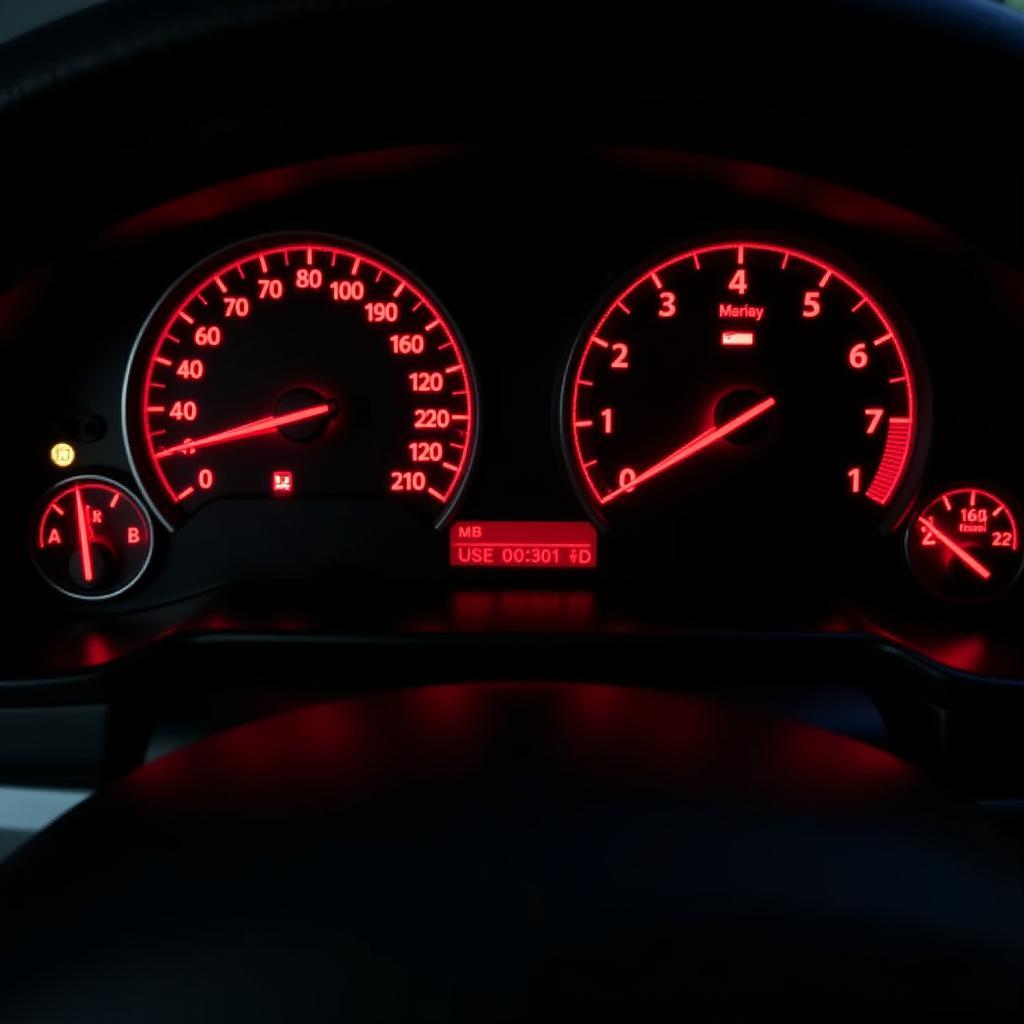BMW vehicles are renowned for their performance, luxury, and advanced technology. However, this complexity can sometimes lead to intricate issues that require specialized diagnostic tools and expertise. Understanding your BMW’s diagnostics is crucial for maintaining optimal performance and addressing any potential problems effectively.
This comprehensive guide delves into the world of Bmw Car Diagnostics, providing you with the knowledge and resources to navigate the intricacies of your vehicle’s health.
Why BMW Car Diagnostics Matter
Gone are the days of simple car maintenance. Modern BMWs are equipped with sophisticated electronic systems that control everything from engine performance to safety features. When an issue arises, these systems generate diagnostic trouble codes (DTCs), which act as vital clues for identifying the root cause.
 BMW Dashboard Warning Lights
BMW Dashboard Warning Lights
Ignoring these warning signs can lead to more severe problems and costly repairs down the line. Regular BMW car diagnostics enable you to:
- Detect Issues Early: Identify potential problems before they escalate, saving you time, money, and potential headaches.
- Maintain Peak Performance: Ensure your BMW operates at its best, enjoying optimal fuel efficiency, responsiveness, and overall performance.
- Make Informed Decisions: Understanding the diagnostics empowers you to make educated decisions about repairs and maintenance.
- Enhance Resale Value: A well-maintained BMW with a documented diagnostic history holds a higher resale value.
Decoding the Language of BMW Car Diagnostics
BMW car diagnostics involve analyzing the data stored in your vehicle’s onboard computer systems. This data, often presented as DTCs, provides valuable insights into the health of your car.
Here’s a breakdown of how BMW car diagnostics work:
- Connecting to the OBD-II Port: All modern BMWs come equipped with an OBD-II port, typically located under the driver’s side dashboard.
- Retrieving Diagnostic Data: Specialized diagnostic tools, such as code readers or software, connect to the OBD-II port to retrieve the stored diagnostic data.
- Interpreting DTCs: The retrieved data often includes DTCs, which are alphanumeric codes that correspond to specific issues.
- Analyzing Diagnostic Data: Experienced technicians or enthusiasts with the right tools can interpret the DTCs and other diagnostic data to pinpoint the source of the problem.
Essential Tools for BMW Car Diagnostics
The right tools are crucial for unlocking the secrets hidden within your BMW’s electronic brain. Here’s a look at some essential tools:
- OBD-II Code Readers: These handheld devices are readily available and offer a basic level of diagnostic capability. They can read and clear DTCs, providing a starting point for troubleshooting.
- Advanced Diagnostic Software: For more in-depth analysis, specialized software like Carly BMW Diagnostic Tool offers a comprehensive suite of features, including reading and clearing DTCs, monitoring live data streams, and performing advanced functions like coding and programming.
- Battery Testers: A failing battery can cause a cascade of electrical problems and trigger various warning lights. Having a reliable battery tester ensures you’re starting with a healthy electrical system.
Common BMW Diagnostic Issues
While the possibilities are vast, here are some common diagnostic issues encountered in BMWs:
- Engine Management: Problems related to sensors, ignition coils, fuel injectors, or other engine components can trigger engine-related DTCs.
- Transmission Issues: Slipping gears, rough shifting, or transmission warning lights can indicate problems with the transmission control unit or other components.
- Braking System: Issues with ABS, brake wear sensors, or other braking components can compromise safety and require immediate attention.
- Airbag System: Faulty sensors, wiring issues, or deployed airbags can trigger airbag-related DTCs.
DIY vs. Professional BMW Car Diagnostics
While basic OBD-II code readers empower you to perform simple diagnostics, seeking professional help is often recommended for more complex issues.
Here’s when to consider seeking professional help:
- Complex DTCs: Some DTCs require advanced knowledge and specialized tools to interpret accurately.
- Intermittent Issues: Problems that come and go can be challenging to diagnose and may require specialized equipment and expertise.
- Safety-Critical Systems: Issues related to brakes, airbags, or other safety-critical systems are best left to professionals to ensure proper repair and safety.
Expert Insight
“Investing in a reliable diagnostic tool and understanding your BMW’s diagnostic system is like having a direct line to your car’s health. It empowers you to address issues proactively and maintain your BMW’s performance and longevity.” – Mark Williams, Senior BMW Technician
Conclusion
BMW car diagnostics are crucial for maintaining the performance, reliability, and safety of your vehicle. By understanding the basics, utilizing the right tools, and knowing when to seek professional help, you can keep your BMW running smoothly for miles to come.
Remember, proactive maintenance through regular diagnostics is always preferable to reactive repairs.
FAQs
1. How often should I perform BMW car diagnostics?
It’s generally recommended to perform diagnostics at least once a year or whenever you experience unusual performance issues or warning lights.
2. Can I use any OBD-II code reader on my BMW?
While most OBD-II code readers can retrieve basic DTCs, it’s recommended to use tools and software specifically designed for BMWs for more comprehensive diagnostics.
3. What is BMW INPA?
INPA is a dealer-level diagnostic software for BMWs that offers advanced features and functionality. However, it requires technical expertise and specialized hardware.
4. Can I code or program my BMW myself?
While possible with the right tools and knowledge, coding and programming can have unintended consequences if not performed correctly. It’s generally recommended to leave this to experienced professionals.
5. Where can I find reliable information about BMW car diagnostics?
Reputable online forums, BMW enthusiast communities, and websites like BMW Car Diagnostic offer valuable resources and insights.
Need Help with Your BMW Car Diagnostics?
Contact us via WhatsApp: +1(641)206-8880, Email: [email protected]. Our team of BMW diagnostic experts is available 24/7 to assist you.

Leave a Reply